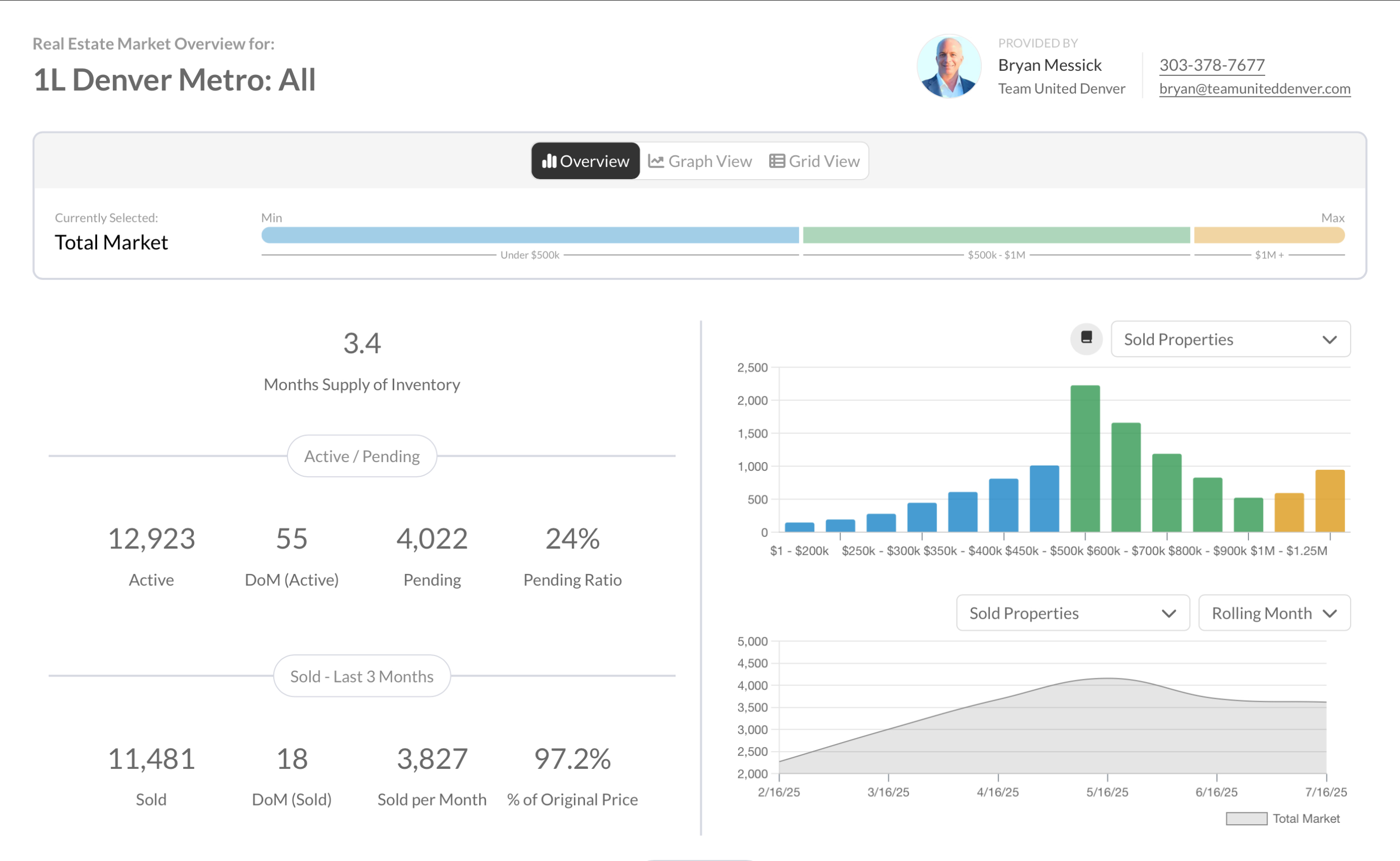Published July 18, 2025
Is Denver’s Housing Market Headed for a Correction? What Buyers & Sellers Should Know in 2025

Is Denver's Housing Market Headed for a Correction? What Buyers & Sellers Should Know in 2025
If you've been following Denver real estate headlines lately, you've probably seen some alarming terms thrown around: "market correction," "housing bubble," "price drops," and even the dreaded "crash." With mortgage rates hovering above 6%, inventory climbing, and homes sitting on the market longer than we've seen in years, it's natural to wonder if Denver's red-hot housing market is finally cooling off—or worse, heading for a significant correction.
But before you panic or celebrate (depending on which side of the market you're on), let's dig into what's really happening with Denver's housing market in mid-2025, separate fact from fiction, and give you the straight talk on what it means for both buyers and sellers.
The Current State of Denver's Housing Market
First, let's look at what the data actually tells us about Denver's real estate market right now:
- Inventory is definitely up – New listings have surged 28% compared to this time last year, giving buyers significantly more options than the scarcity we saw from 2020-2023.
- Prices have stabilized – The median home price in Denver sits at $600,000, which represents just a 2% increase year-over-year—a far cry from the double-digit jumps we saw during the pandemic boom.
- Homes are taking longer to sell – The median days on market has stretched to 47 days, up from 37 days at this time last year. This means buyers have more time to think, and sellers are feeling the pressure.
- Sales activity remains resilient – Despite doom-and-gloom predictions, closed sales actually rose 5% year-over-year in June 2025, outperforming the national average, which saw a slight decline.
Correction vs. Normalization: What's Actually Happening?
Let's address the big question head-on: Is Denver facing a market correction in 2025?
The short answer: We're seeing a market normalization, not a crash or major correction.
Here's why that distinction matters:
A true market correction is typically defined as a decline of 10% or more from recent peaks. What we're witnessing in Denver is more accurately described as a recalibration or balancing of the market after years of unsustainable growth.
Several factors support this "soft landing" scenario:
- Denver's job market remains strong – Employment growth continues to outpace the national average, particularly in tech, healthcare, and aerospace sectors.
- Population growth continues – Despite some pandemic-era predictions of urban exodus, Denver's population is still growing, creating sustained housing demand.
- Housing supply remains constrained – While inventory has increased, Denver still faces fundamental supply limitations due to geographical constraints and development restrictions.
- No surge in distressed properties – Unlike during the 2008 crash, we're not seeing a wave of foreclosures or underwater mortgages flooding the market.
Most experts project minor price adjustments through the remainder of 2025 (potentially even a slight 0.1% dip by year-end), followed by modest gains resuming in 2026. This represents a shift toward balance rather than a bubble burst.
What Today's Market Means for Denver Buyers
If you're looking to buy in Denver this year, the market dynamics have definitely shifted in your favor compared to the feeding frenzy of recent years:
1. You Have More Negotiating Power
With inventory up and homes sitting longer, buyers finally have some leverage. About 50% of homes are now seeing price reductions before selling, and 60% of sellers are offering concessions (averaging $8,760) to close deals.
This means you can:
- Request repairs after inspection
- Ask for closing cost assistance
- Negotiate seller concessions like rate buydowns
- Make offers below asking price (within reason)
2. You Have Time to Make Decisions
Remember when you had to make an offer the same day a house hit the market? Those days are (mostly) gone. With homes taking an average of 47 days to sell, you can actually visit a property multiple times, sleep on your decision, and conduct thorough due diligence.
3. Financing Options Are Expanding
While mortgage rates remain higher than the record lows of 2020-2021, the stabilization between 6.0-6.5% has allowed more creative financing options to emerge:
- More sellers are willing to buy down your rate for 1-2 years
- Assumable mortgages are making a comeback for FHA and VA loans
- Some lenders are offering 2-1 buydown programs to ease the initial payment shock

4. Neighborhoods Matter More Than Ever
This balanced market has created greater price variability between neighborhoods. While some highly desirable areas still see multiple offers and quick sales, others are experiencing significant price adjustments.
Research neighborhood-specific trends before making an offer—what's happening in Cherry Creek may be completely different from market conditions in Highlands Ranch or Arvada.
What Today's Market Means for Denver Sellers
If you're planning to sell in Denver in 2025, you're not facing a crash, but you are facing a more challenging environment than sellers enjoyed from 2020-2023:
1. Realistic Pricing Is Critical
The days of testing an aspirational price and quickly getting multiple offers above asking are largely behind us. With half of homes requiring price reductions before selling, getting the initial listing price right is more important than ever.
Work with your agent to:
- Look at recent comparable sales (from the last 90 days, not 6+ months ago)
- Factor in current interest rates when estimating buyer budgets
- Consider the specific condition of your property compared to the competition
- Analyze how many similar homes are currently listed in your area
2. Property Preparation Makes a Difference
With more inventory, buyers can afford to be choosier. Homes in move-in condition with updated kitchens and bathrooms are still selling faster and for higher prices than those needing work.
Strategic pre-listing improvements—like fresh paint, deep cleaning, minor repairs, and professional staging—typically deliver a strong return on investment in this environment.
3. Be Prepared to Negotiate
About 60% of sellers are now offering some form of concession to close deals. This might include:
- Covering some closing costs
- Agreeing to necessary repairs after inspection
- Offering rate buydowns or temporary interest rate subsidies
- Providing home warranties
Building some negotiation room into your plans is prudent in today's market.
4. Patience Is Required
With homes taking an average of 47 days to sell (and many taking longer), adjust your expectations and timeline accordingly. The "sell in a weekend" scenarios aren't completely gone, but they're far less common in mid-2025.

Looking Ahead: Denver's Real Estate Outlook for 2025-2026
As we look toward the remainder of 2025 and into 2026, several factors will influence Denver's housing market:
- Interest Rates: Economists expect rates to remain in the 6.0-6.5% range through 2025, with potential modest decreases in 2026 as inflation continues to moderate.
- Inventory Growth: While inventory has increased, new construction still lags behind population growth, limiting how much supply can expand.
- Economic Conditions: Colorado's diverse economy provides insulation from major downturns, but any national recession could temporarily impact buyer confidence.
- Migration Patterns: Denver continues to attract relocations from higher-cost coastal markets, creating a floor for housing demand.
The consensus among real estate economists points to a stabilizing market with modest price growth resuming by late 2025 or early 2026—not the dramatic correction some headlines might suggest.
The Bottom Line for Denver Real Estate in 2025
Denver's housing market is experiencing a rebalancing, not a crash. After years of unsustainable price growth and a market heavily tilted toward sellers, we're moving toward more neutral territory that better serves both buyers and sellers.
For buyers, this means more options, less pressure, and increased negotiating power—but not dramatic price drops that would fundamentally change affordability.
For sellers, it means adapting to a more normal market where accurate pricing, property preparation, and patience are required—but not panic selling or accepting significant losses.
Whether you're buying or selling in Denver this year, working with an experienced local real estate professional who understands these nuanced market dynamics is more valuable than ever. The days of "any agent can sell any house" in a hot market are behind us, at least for now.
Want to discuss your specific situation or neighborhood in more detail? Contact our team for a personalized market analysis and strategy session. We're helping buyers and sellers successfully navigate these shifting market conditions every day.





